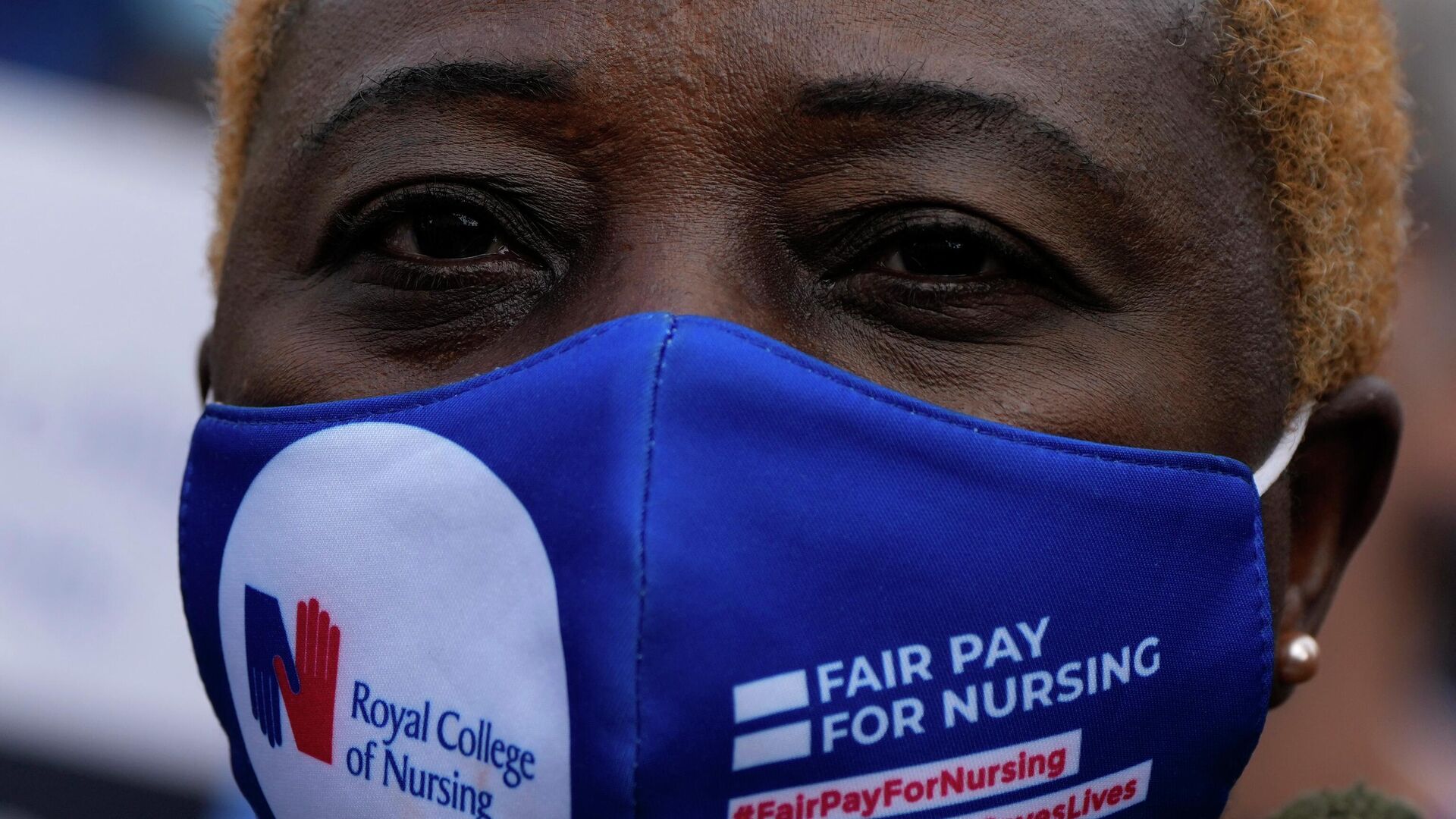UK Nurses to Strike For Two Days Next Month

© AP Photo / Alastair Grant / A member of the Royal College of Nursing (RCN) attends a protest for increased wages
Subscribe
Nurses across Britain will be going on strike for two separate days next month, the Royal College of Nursing (RCN) announced on Friday. The strike across England, Wales, and Northern Ireland by members of the RCN comes as offers to talk about increased pay for nursing staff have not been addressed by ministers, says the union.
The Royal College of Nursing (RCN) has announced a strike for two separate days next month, making it the first strike in 106 years. The strike is expected to last for 12 hours on each day. The strike follows a record number of National Health Service (NHS) members quitting in droves: in September it was reported by a British news outlet that in the past year more than 40,000 healthcare workers stepped away from their roles.
"Nursing staff have had enough of being taken for granted, enough of low pay and unsafe staffing levels, enough of not being able to give our patients the care they deserve," said Pat Cullen, the General Secretary and Chief Executive of the RCN.
Nurses are exhausted after a global pandemic exacerbated pre-existing issues in their field of work including: low-pay, lack of safety, long hours, and disrespect. Inflation has worsened the issue of low wages for many occupations, with postal workers, school and university staff, and rail unions also striking for higher compensations.
The first nurses' strike will occur on December 15, during the same week when rail strikes by the Rail, Maritime and Transport (RMT) union will take place. December 15 will also be the second day of a 48-hour walkout by postal workers. The second nurses' strike will take place on December 20.
“I was completely exhausted and just demoralized,” said Leena Myllynen, 32, who left the NHS after she was unable to pay her bills. “I was never, ever able to make it through to payday, even when I worked extra hours."
While the NHS, which is one of the world's largest employers, is expected to receive £3.3 billion for 2023 to 2024, and 2024 to 2025, as promised by Chancellor Jeremy Hunt, experts are saying that won't be enough to keep their beloved system from sinking, in fact: it's just half of what the institution actually needs.
“The NHS warned it needed more money to cope with the impact of inflation on its costs,” said Nigel Edwards, the chief executive of the independent thinktank Nuffield Trust, who adds that the chancellor's allotted amount will not account for the £2.5 billion worth of inflation that is stretching the system to its breaking point. “Today’s autumn statement has provided much-needed extra cash from April over the next two years, but this is only around half of what the NHS had warned last month would likely be needed.”
Another thing the NHS needs to stay afloat? Workers. And those workers---the ones who haven't quit, at least---are demanding a 19.2% pay raise that would cost £10 billion per year with £1,400 in raises per nurse for this year, according to the British Health Secretary Steve Barclay, who warns that the nurses' demands are not "affordable".
"These are challenging times for everyone and the economic circumstances mean the RCN’s demands... are not affordable," Barclay said.
Barclay is right about one thing: Britain is currently facing a cost-of-living crisis with inflation reaching 11.1% in October, which is a 41-year-high for the country that has recently put in the hands of Prime Minister and Leader of the Conservative Party Rishi Sunak, a former banker who is the first person of color to lead Britain.
The NHS also has a backlog of 7 million patients on its waiting list for hospital treatments. When Myllynen's partner, for example, experienced severe pneumonia and blood clotting he ended up sleeping on the floor of an emergency room for 12 hours because no beds were available, despite him being an NHS doctor.
"Why on Earth is the Health Secretary refusing to negotiate with nurses?" said Wes Streeting, the opposition Labour Party's health spokesperson . "Patients already can’t get treated on time, strike action is the last thing they need, yet the Government is letting this happen."
"I am sorry we are having to do this," said Shaun Williams, a hospital nurse who is prepared to strike though he finds it to be upsetting. "But we are doing it for the right reasons, we are doing it for patient safety. You are running on reserves most days. We do not have enough staff and because of the lack of nurses, patients are at risk."
"Unless we pay nurses more we are not going to attract people or keep people," he added.

